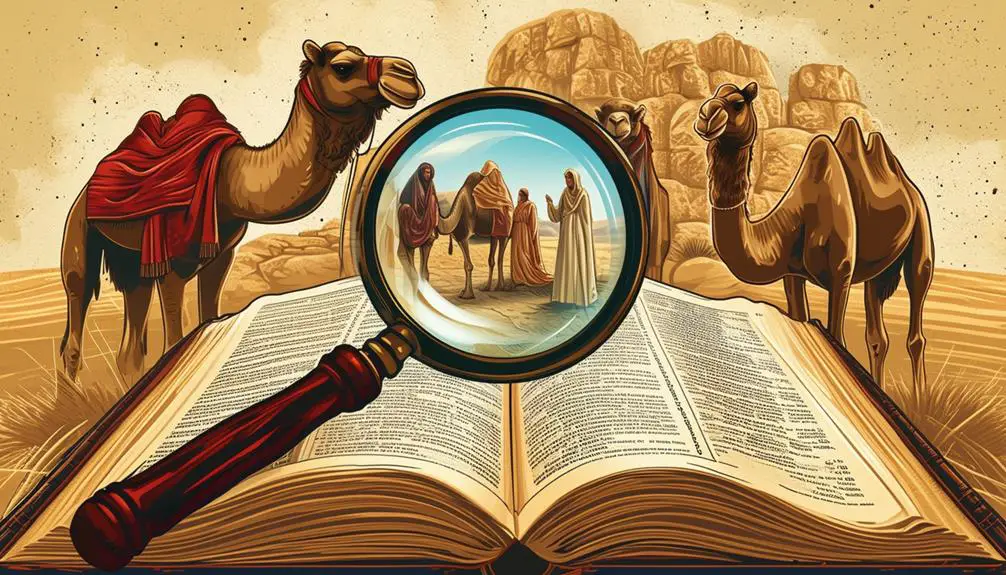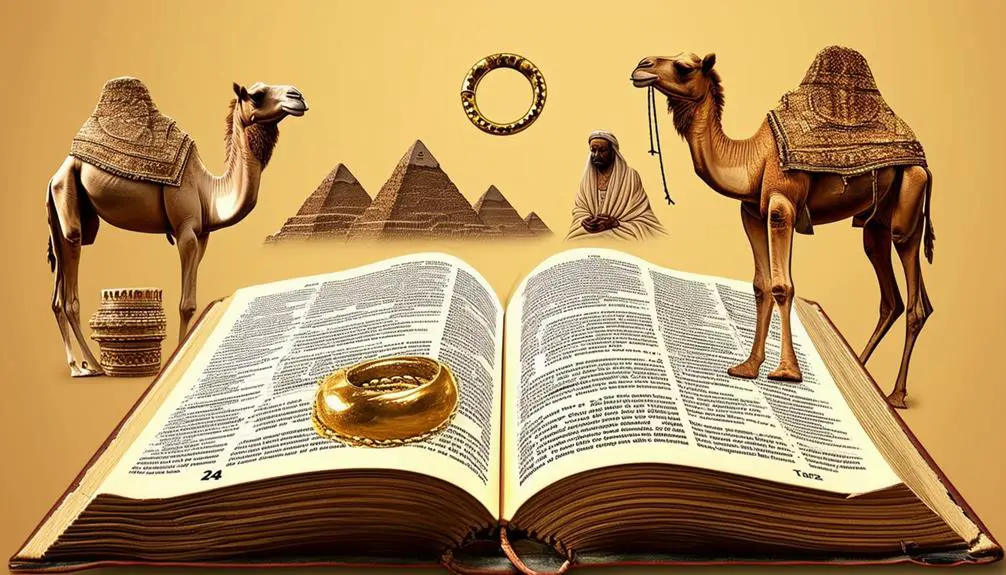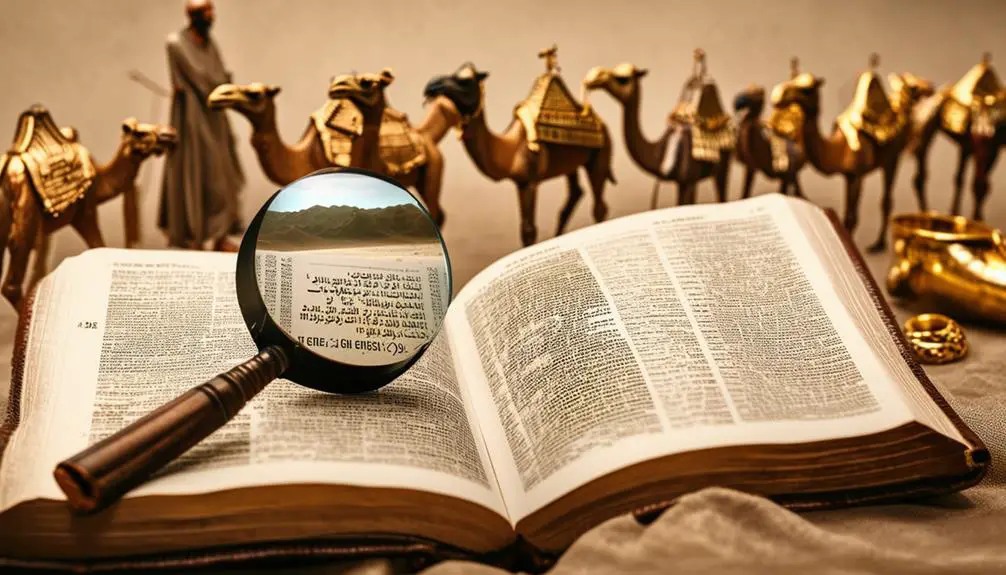Witness divine providence, faith, and ancient customs unravel in Genesis 24, a captivating chapter filled with intricate symbolism and profound biblical insights.

Bible Study – The Book of Genesis – Chapter 24 – Summary and Analysis
In Genesis 24, you'll explore themes of faith, obedience, and divine providence, set within the context of ancient marital customs. Here, Abraham sends his servant on a divinely guided mission, seeking a wife for Isaac from their clan. This chapter involves key figures: Abraham, Isaac, Rebekah, and the stalwart servant whose faith leads him to Rebekah. Their actions, shaped by faith and obedience, have significant symbolism, intertwining with themes like providence and chosen lineage. By further exploration, you'll uncover deeper insights and intricate symbolism that define this fascinating chapter.
Key Takeaways
- Genesis 24 illustrates themes of faith, obedience, divine providence, and ancient marital customs.
- Key characters include Abraham, his servant, Isaac, and Rebekah, each embodying different virtues.
- Abraham's servant's journey to find Isaac's wife, guided by divine intervention, is a major event.
- The chapter explores underlying themes of promise, obedience, faith in providence, and blessings.
- Understanding Genesis 24 requires acknowledging its historical significance, biblical genealogy, rich symbolism, and cultural norms.
Chapter 24: Quick Summary

In delving into the 24th chapter of Genesis, you'll find it's a significant narrative brimming with themes of faith, obedience, and divine providence, all intricately woven into the tapestry of Abraham's quest for a suitable wife for his son, Isaac. This pivotal chapter provides a rich exploration of ancient marital customs while simultaneously emphasizing the enduring belief in divine guidance.
The chapter commences with Abraham, nearing the end of his life, ensuring the continuity of his lineage and the fulfillment of God's promises. He tasks his elder servant with a mission: to find a wife for Isaac from his own kinfolk, not from the Canaanites. Here, you see a glimpse of the marital customs of the time, which favored marriages within one's own tribe to maintain ethnic and religious purity.
As the narrative unfolds, you'll notice divine guidance is depicted as an active, guiding force. The servant's prayer for a sign and its immediate fulfillment in Rebekah's appearance underscore this theme. The servant's successful journey, guided by God, reinforces the concept of divine providence in human affairs.
Thus, Genesis 24 offers you a vivid tableau of faith, obedience, marital custom, and divine guidance intertwined in the saga of the chosen lineage.
Key Characters Analysis
Delving into the character analysis, you'll find that this chapter's key players – Abraham, his servant, Isaac, and Rebekah – each play pivotal roles in the unfolding narrative, their actions and decisions shaped by faith, obedience, and divine providence.
Abraham, driven by the motivation to secure the continuity of God's covenant, entrusts his faithful servant with a significant task – securing a wife for Isaac from his kinfolk. Through this action, Abraham demonstrates not just his faith in God's promise but also his adherence to divine instruction.
The servant, unnamed but crucial, embodies obedience and unwavering faith. His fervent prayers for guidance and the subsequent divine interventions that lead him to Rebekah underscore his role as a conduit of divine will.
Isaac, though less active, anchors this narrative with his quiet acceptance and trust in his father's decisions, embodying faithful submission.
Rebekah emerges as a figure of hospitality, kindness, and compliance. Her character motivations are deeply intertwined with her faith, making her an ideal match for Isaac.
In essence, these characters, their motivations, and their interaction with divine interventions paint a compelling picture of faith in action.
Significant Events Dissected

Let's dissect the key events of Genesis Chapter 24, as they offer a profound look into divinely orchestrated encounters and faith-driven actions. The chapter begins with Abraham, now old and well-advanced in years, instructing his senior servant to find a wife for his son Isaac from his own people. This event reflects Abraham's deep understanding of covenantal importance – he wished to preserve the divine promise made to his lineage, and therefore, sought a suitable match within his own clan.
The servant's journey, guided by fervent prayers for Divine Intervention, leads him to Rebekah. Her act of drawing water for the servant and his camels was seen as a sign from God, a divine orchestration of events to fulfil Abraham's desire. Rebekah's willingness to leave her family and travel to a distant land to marry a man she had never met shows an inspiring faith-driven action.
In dissecting these events, we see how Divine Intervention and covenantal importance play significant roles in the narrative. They highlight the trust in divine providence and the commitment to preserving divine promises, central themes in the book of Genesis.
Symbolic Interpretations
Peeling back the layers of Genesis Chapter 24, you'll discover rich symbolic interpretations that shed light on the characters' roles and divine interactions. This chapter is rife with spiritual allegories that convey profound spiritual truths.
Right from the beginning, Abraham's servant's journey signifies a divine mission, underpinned by Divine Intervention. The servant's prayer and subsequent meeting with Rebekah symbolize the divine guidance and providence in the selection of Isaac's spouse.
Rebekah's acceptance of the offer, her immediate departure from her family, and her covering herself upon seeing Isaac, all serve as powerful metaphors. These actions represent obedience, faith, and modesty – virtues cherished in biblical narratives. Rebekah's character stands as a spiritual allegory of the church, obedient and ready for the bridegroom, exemplified by Isaac.
The gifts offered by the servant to Rebekah and her family echo the spiritual gifts bestowed by God onto the church. This exchange of gifts demonstrates God's generosity and the reciprocal gratitude expected from believers.
Underlying Themes Explored

In examining Genesis Chapter 24, you'll encounter several profound themes. You'll see the interplay of promise and obedience, the demonstration of faith in providence, and the intertwining of blessings and prophecy. As you engage in this study, consider how these themes both impact the narrative and reflect broader spiritual principles.
Promise and Obedience
Delving into the profound themes of promise and obedience in Genesis Chapter 24, you'll uncover an intricate interplay of faith, loyalty, and divine assurance that shapes the narrative's course. The Divine Commitment, a promise between God and Abraham, is pivotal here, setting the stage for the unfolding drama. The Obedience Significance is also vital, demonstrating the faith-driven actions of Abraham's servant in seeking a wife for Isaac. This obedience is not blind but motivated by a firm belief in the divine promise. Therefore, promise and obedience emerge as two intertwined themes, each reinforcing the other. The divine promise provides the impetus for obedience, and obedience, in turn, validates and actualizes the promise. This dynamic interplay creates a profound theological message about the nature of divine-human relationships in the biblical narrative.
Faith in Providence
Underlying the narrative of Genesis Chapter 24, you'll find a profound theme of 'faith in providence', a concept that further enriches our understanding of the biblical characters' relationship with the divine. This Providence Perception, as we'll call it, is reflected in their unwavering trust in divine guidance, especially in uncertain or challenging circumstances.
Their Divine Dependence is not a product of blind belief but a consequence of their deep-seated faith. It's their understanding that providence isn't mere luck or coincidence, but the divine hand guiding their lives. This perception, this faith in providence, is a reflection of their spiritual depth. It reveals their belief that every event, big or small, is part of a larger divine plan, a manifestation of God's will and purpose.
Blessings and Prophecy
While exploring the theme of 'Blessings and Prophecy' in Genesis Chapter 24, you'll notice a pattern of divine promises and prophetic utterances that play a significant role in the unfolding narrative. The concept of Divine Intervention, illustrated through providential blessings, becomes a central theme. You observe Abraham's servant praying for guidance, and God responding affirmatively, underscoring the divine sanction given to the mission.
This chapter also highlights Prophetic Fulfillment. Rebekah's family blesses her with a prophecy, wishing her to be "the mother of thousands of ten thousands". Indeed, she becomes the ancestress of Israel, validating the prophecy. This intertwining of blessings and prophecies in Genesis 24 adds a rich layer of theological depth, reinforcing the covenantal relationship between God and His chosen people.
Broader Context in Genesis

As you explore the broader context of Genesis, it is crucial to acknowledge its historical significance, not only as a book of the Bible but also as a chronicle of cultural and societal norms of its era. You'll appreciate how understanding biblical genealogy aids in comprehending the intricate relationships and alliances that shape the narrative. Lastly, be mindful of the rich symbolism interwoven throughout Genesis, as it serves as a vehicle to convey profound truths and lessons.
Genesis' Historical Significance
Delving into the historical significance of Genesis, you'll find that it's not just a collection of religious stories, but an essential cultural and historical document that has deeply influenced societal norms and values. The 'Genesis' influence extends beyond religious spheres, as it has shaped legal, ethical, and social structures globally. Its cultural impact is evident in literature, art, and even politics. The narratives in Genesis, from the creation of the world to the covenant with Abraham, have provided a framework for understanding human nature, morality, and divinity. Indeed, Genesis has been a pivotal reference point, contributing to the dialogue between religious and secular thought. Its historical significance lies not only in its religious implications, but also in its profound influence on human consciousness and culture.
Understanding Biblical Genealogy
Building on the profound impact of Genesis on societal structures, it's equally important for you to comprehend the biblical genealogy presented within its pages. The ancestral connection to the patriarchs Abraham, Isaac, and Jacob is pivotal to understand. It's in these genealogical patterns we find the backbone of Genesis, a lineage that serves as the foundation for the future tribes of Israel. The complexity of these relationships, the intricate nature of the births, marriages, and deaths, not only acknowledges the significance of family in ancient societies but also provides insight into the divine intervention and promises made by God. Hence, understanding biblical genealogy isn't just about tracing roots; it's about appreciating the intricate narrative woven by these relationships and their profound influence on biblical theology.
Symbolism in Genesis
One can't ignore the potent symbolism woven into the fabric of Genesis, serving as a broader context and offering deeper insights into the undercurrents of biblical narratives. You'll notice that these allegories, like the threads of a tapestry, reveal a profound understanding of Divine Guidance that transcends literal interpretation.
Consider this table of Genesis allegories and their symbolisms:
Genesis Allegories |
Symbolism |
|---|---|
The Garden of Eden |
Divine provision and protection |
Adam and Eve |
Human disobedience and fall |
Cain and Abel |
Human conflict and jealousy |
The Flood |
Divine judgement and redemption |
The Tower of Babel |
Human pride and divine intervention |
As you explore further, you'll find that these symbolisms in Genesis aren't merely literary devices, but they're a reflection of God's relationship with humanity.
Frequently Asked Questions
How Does Chapter 24 Fit Into the Overall Timeline of the Bible?
In the Bible's timeline context, Genesis 24 fits in as a foundational piece. It's where Abraham's servant finds a wife for Isaac, his son, marking the continuation of God's covenant. It's significant because it sets prophetic implications for future events and the lineage of Jesus. You're seeing the start of God's grand plan, weaving together a tapestry of events and individuals that ultimately lead to Jesus' birth and the salvation of mankind.
What Is the Historical Significance of the Places Mentioned in Genesis Chapter 24?
In Genesis 24, you'll find significant places like Nahor and Canaan. Their significance? They're stages for Abraham's diplomacy. Nahor, Abraham's homeland, is where his servant finds Isaac's betrothed, Rebekah. Canaan, the Promised Land, signifies God's covenant with Abraham's descendants. Understanding these places, you'll appreciate the masterful blend of geography and theology, providing a rich backdrop for the unfolding of God's plan.
Are There Any Cultural Customs Specific to That Time Period Depicted in Chapter 24?
Yes, there are. In Genesis 24, you'll find early marriage traditions such as arranged marriages and dowries. Also, you'll see the servant's oath, an ancient custom where a servant swears loyalty by placing his hand under his master's thigh. These customs reflect the social and cultural norms of that period, offering you a glimpse into the historical context and lifestyle of the time.
How Does Chapter 24 Influence the Theological Perspectives Within Genesis?
In Genesis 24, you'll notice how theological perspectives are influenced. The theme of Divine Guidance is apparent, as Abraham's servant seeks a wife for Isaac. This highlights God's active role in guiding our lives. Additionally, the marriage symbolism signifies the covenant relationship God desires with His people. It's through this chapter, you can truly grasp the depth of God's involvement and His enduring promise.
Are There Any Linguistic Nuances in the Original Text of Genesis Chapter 24?
Yes, there are indeed linguistic nuances in Genesis 24. For instance, textual variations appear due to differences in ancient manuscripts. You'll find that Hebrew idioms, unique to the language and culture, are present. These idioms often require careful interpretation to understand in a modern context. It's important to study these nuances to fully grasp the rich, theological tapestry woven in Genesis 24.



Sign up